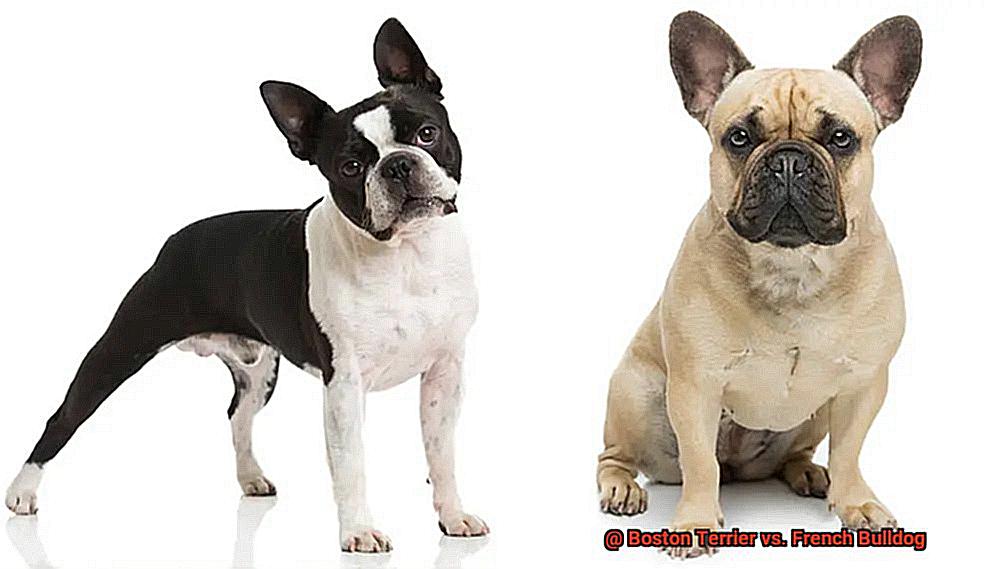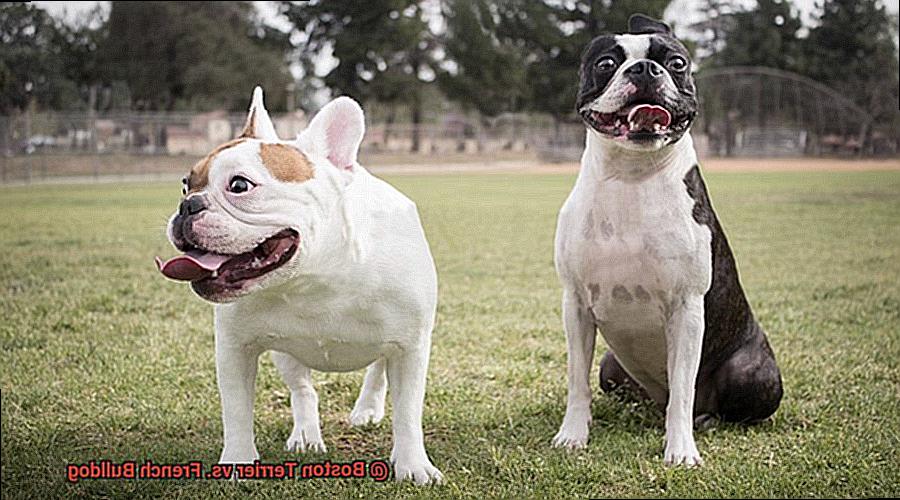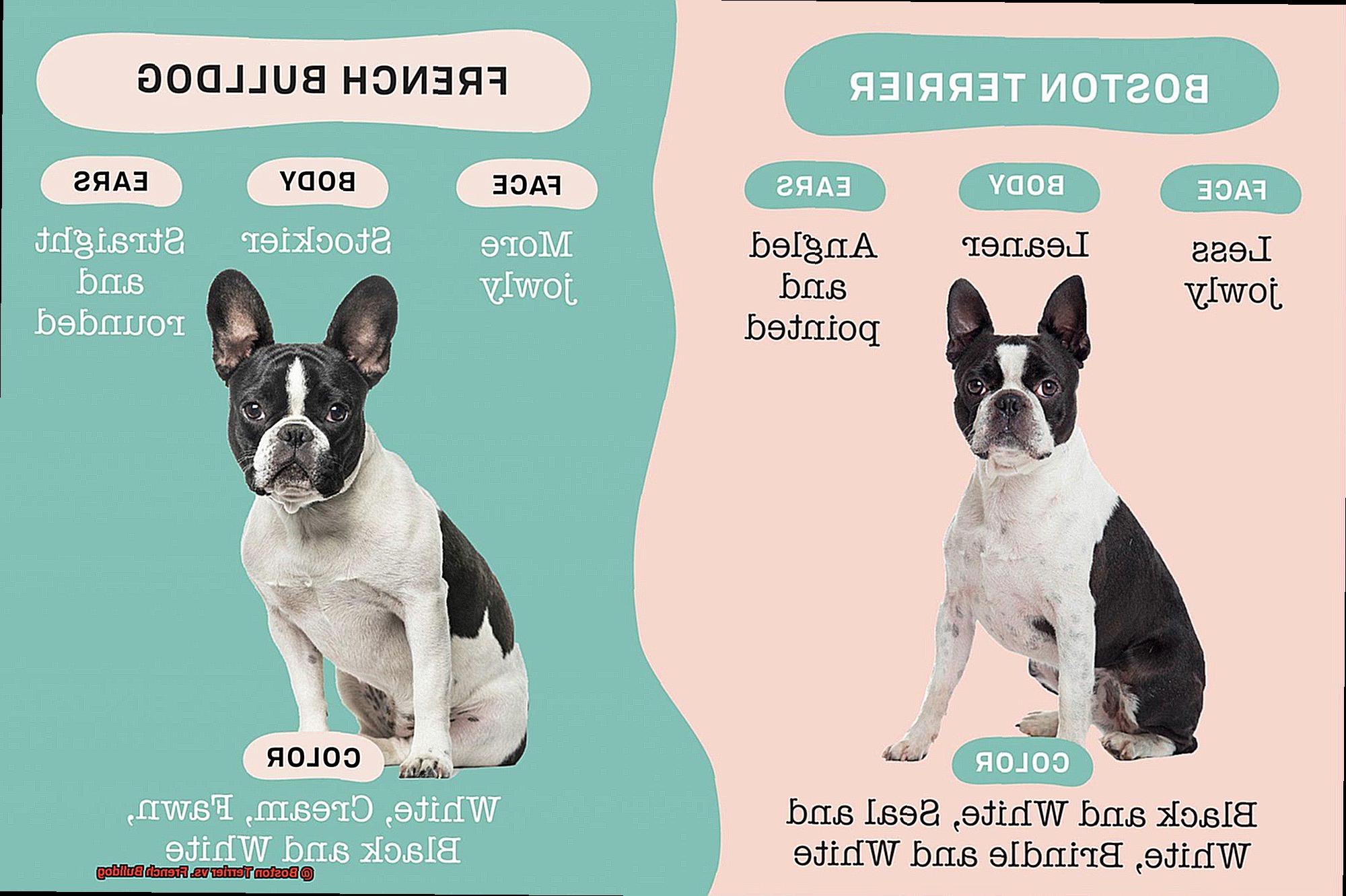Boston Terrier vs. French Bulldog?
Are you trying to decide between a Boston Terrier and a French Bulldog?
It can be difficult to choose between these two breeds, as they both have unique characteristics and personalities. But don’t worry – we’re here to help.
We’ll compare the Boston Terrier to the US in this blog post. Plus, we’ll provide a cartoon that illustrates the main points of each breed so you can make an informed decision when it comes time to selecting your puppy.
Let’s start by looking at their dimensions. The Boston Terrier is a medium-sized dog weighing 10-25 pounds, while the French Bulldog is much smaller at 18-28 pounds.
Their personalities are also quite different. The Boston Terrier is known for its intelligence and outgoing personality; it loves being part of the family and playing with its owners.
On the other hand, the French Bulldog prefers lounging around or cuddling up with its favorite human companion. Both breeds need regular grooming, but the Boston Terrier requires more frequent grooming due to its longer coat compared to a French Bulldog’s short coat.
When it comes to exercise requirements, both breeds are low energy dogs; however, they still need some regular exercise in order to stay healthy and happy. A brisk walk or playtime in your backyard would be sufficient for either breed – just make sure they get enough exercise every day.
Now that you know more about each breed’s characteristics, you can make an informed decision when choosing your puppy – whether it be a Boston Terrier or French Bulldog.
Physical Characteristics: A comparison of the size, shape and color of Boston Terriers and French Bulldogs
Contents
- 1 Physical Characteristics: A comparison of the size, shape and color of Boston Terriers and French Bulldogs
- 2 Temperament: An exploration of the differences in personality between Boston Terriers and French Bulldogs
- 3 Health Considerations: Potential health risks for both breeds and how to keep them healthy
- 4 Exercise Requirements: The exercise needs for both breeds and how to meet them
- 5 Grooming Needs: Grooming requirements for both breeds and tips on keeping them well-groomed
- 6 Training Tips: Training techniques for both breeds and how to make it successful
- 7 Living Conditions: What type of living conditions are best suited for each breed
- 8 Alternatives to French Bulldogs: An overview of similar breeds that may be a good alternative
- 9 Conclusion
When it comes to choosing the perfect pup, few breeds can compete with the Boston Terrier and French Bulldog.
While they may share similarities in size and coat, it’s their distinct shape and color that make them truly unique. Boston Terriers are slightly larger than French Bulldogs, typically weighing between 12-25 pounds.
They have an athletic build with a longer snout and slender body, while French Bulldogs have a more compact frame and shorter snout, which can make them more vulnerable to certain health issues such as respiratory problems.
In terms of color, both breeds come in a wide range of shades, but Boston Terriers are most commonly seen in black and white while French Bulldogs are usually fawn or brindle.
When selecting a breed for your home, physical characteristics should be taken into serious consideration.
Temperament: An exploration of the differences in personality between Boston Terriers and French Bulldogs
When it comes to selecting between a Boston Terrier and French Bulldog as your pet, it can be a difficult decision.
Although they may share some physical similarities such as their short snouts and compact frames, their personalities are vastly different. Boston Terriers are known for being lively, curious, and intelligent.
They have an entertaining sense of humor that makes them great fun to be around. However, they also require lots of exercise and mental stimulation to prevent boredom and destructive behavior.
On the other hand, French Bulldogs are more affectionate and sociable but also laid-back and relaxed. They don’t need as much exercise as Boston Terriers but can be stubborn at times and require more patience when it comes to training.

Ultimately, potential owners should consider their own lifestyle when deciding which breed to choose. If you’re looking for a vivacious companion with a larger personality, then the Boston Terrier might be the way to go.
But if you prefer a calmer pet that is more relaxed, then the French Bulldog could be the right fit for you.

Health Considerations: Potential health risks for both breeds and how to keep them healthy
When it comes to choosing between the popular Boston Terrier and French Bulldog breeds, it’s important to consider their potential health risks and how to keep them healthy.
Both breeds are prone to certain health issues due to their shape and build, such as allergies, respiratory issues, eye problems, joint issues, and overheating. The French Bulldogs are also more susceptible to spinal problems, hip dysplasia, and skin disorders.
On the other hand, Boston Terriers are more at risk of heart disease and certain types of cancer. To ensure your pup stays in good health, preventive measures must be taken along with regular vet check-ups.
This includes keeping them at a healthy weight with a high-quality diet and providing them with regular exercise and fresh water. Proper grooming is also essential for both breeds since they have sensitive skin.
Additionally, appropriate climate control should be maintained to avoid exposing them to extreme temperatures as they can easily overheat. Monitor their breathing for any signs of respiratory distress while regular eye exams can catch any eye problems early on.
Joint supplements can help prevent joint pain in both breeds as well. Although both breeds are prone to some health issues, with proper care and attention they can live long and healthy lives.

Regular vet visits coupled with proactive care can help detect any potential health issues early on so don’t forget those.
Exercise Requirements: The exercise needs for both breeds and how to meet them
If you are thinking of bringing home a Boston Terrier or French Bulldog, it is important to understand their exercise requirements.
Both breeds need moderate amounts of exercise, with daily walks of 30 minutes for the Boston Terrier and 20-30 minutes for the French Bulldog. To keep them physically and mentally stimulated, interactive toys such as puzzle feeders and games of fetch are great options.

However, it is important to note that these breeds are sensitive to extreme temperatures, so exercising them in extreme heat or cold should be avoided. Additionally, they should be supervised during playtime to prevent injury and monitor any respiratory issues they may have.
The Pug is a small breed with lower exercise requirements than the Boston Terrier or French Bulldog, while the Cavalier King Charles Spaniel is known for its gentleness and simplicity of care.
Grooming Needs: Grooming requirements for both breeds and tips on keeping them well-groomed
Grooming your Boston Terrier or French Bulldog is an easy and enjoyable way to strengthen the bond between you and your furry friend.
These beloved breeds have similar coat styles that require minimal care, but there are some differences to keep in mind. Boston Terriers require weekly brushing, occasional baths, and regular nail trimming.
It’s important to use a hypoallergenic shampoo to avoid skin allergies. French Bulldogs also need regular brushing and bathing, but they need additional attention for their folds and ears.
Their folds should be cleaned regularly to prevent infection, and their ears should be checked for dirt and wax buildup that can lead to ear infections. Additionally, it’s important not to overexert them during grooming sessions; a harness should be used instead of a collar to prevent pulling on their necks.
Training Tips: Training techniques for both breeds and how to make it successful
Training your Boston Terrier or French Bulldog can be a rewarding experience for both you and your pet. Not only will it help you strengthen the bond between you and your pup, but it will also help keep them healthy and happy for years to come. To make sure that your training is successful, there are a few tips and tricks that can help you get the most out of each session.
Positive Reinforcement
Positive reinforcement techniques are essential for successful training with both breeds. This includes treats, verbal praise, and playtime. Both breeds are also effective when it comes to clicker training, which uses a clicking sound to indicate desired behaviour.
Routines

Establishing routines is key when it comes to training these breeds. Regular training sessions, aerobics, playtime, and rest periods help keep your dog focused and happy. When training Boston Terriers, it’s important to keep their short attention span in mind by dividing the sessions into shorter intervals. The French Bulldogs respond better to longer sessions, but they do have to be monitored when it comes to treats because they can quickly gain weight.
Avoid Punishment-Based Techniques
It’s important to make learning a positive experience by avoiding punishment-based tactics that can damage the trust and friendship between you and your pet. When it comes to successfully raising either breed of dog, consistency and patience are paramount.
Enjoy the Results
Both Boston Terriers and French Bulldogs can be well-behaved and obedient dogs that provide years of companionship and delight. Training your pup is a great way to create lasting memories together while still guaranteeing their health and happiness for years to come.
Have Fun
Training should be an enjoyable experience for both you and your pup. Don’t forget to have fun during each session; take breaks if needed, reward good behavior with treats or playtime, or try something new like agility courses or obstacle courses.
Living Conditions: What type of living conditions are best suited for each breed
When it comes to selecting the right living conditions for your Boston Terrier or French Bulldog, there are a few important things to consider.
Both breeds are fairly adaptable, but they each have their own unique needs that must be taken into account. Boston Terriers require more exercise than their French Bulldog counterparts, so it is essential to provide them with access to a secure yard or regular walks.
Additionally, due to their short snout, they are especially susceptible to respiratory issues in hot and humid weather. Therefore, temperate climates and air conditioning are best suited for this breed.
French Bulldogs need less exercise than Boston Terriers, but still require daily walks for optimal health and wellbeing. They can tolerate cold climates better than hot ones, but extreme temperatures should be avoided at all costs.
Adequate heating or cooling is necessary for keeping them comfortable no matter the weather.
Alternatives to French Bulldogs: An overview of similar breeds that may be a good alternative
French Bulldogs are beloved for their unique personalities and affectionate nature, but they may not be the ideal pet for everyone due to certain health concerns and high maintenance.

If you’re looking for a similar breed that may be a better fit, there are several alternatives to explore. The Boston Terrier is one such breed.
Known as the “American Gentlemen” due to their tuxedo-like markings and well-mannered behavior, these affectionate and intelligent pups make an excellent companion for those looking for a loyal and loving pet. They are also adaptable and curious, making them an ideal choice for families with children.
Another option is the Pug – small yet playful, these loving pups make great companions for families with small children. Pugs are known for their watchdog skills, high energy levels, and desire to please their human companions.

If you’re looking for an energetic pup who loves outdoor activities, then the Beagle might be your best bet. With their active and outgoing personalities, Beagles are ideal for those who enjoy exercise and outdoor activities.
They also have a friendly and affectionate demeanor that makes them a favorite with children. Lastly, the English Bulldog is another breed that may be an excellent alternative to a French Bulldog.
They are also loyal and protective, making them an excellent watchdog as well.
ecPdhqOtd58″ >
Conclusion
When it comes to selecting the perfect pup, few breeds can compete with the Boston Terrier and French Bulldog.
Both are beloved for their unique characteristics and personalities, making them ideal companions. When deciding between these two breeds, there’s a lot to consider – from their physical appearance and temperaments, to their exercise needs and grooming requirements.
It’s essential to understand each breed’s potential health risks and how best to keep them healthy, as well as their training methods and living conditions. If you’re looking for an alternative breed that may be a better match for your lifestyle, consider the Boston Terrier, Pug, Beagle or English Bulldog.
No matter which breed you choose, remember that proper care and attention will go a long way in ensuring your furry friend stays happy and healthy.




